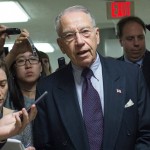BAGHDAD (Reuters) – Iraq’s prime minister has squashed a move by pro-Iranian factions in his government who wanted to retaliate against President Donald Trump’s travel ban. The struggle shows the difficult position the Iraqi leader finds himself in – pulled between his most powerful neighbor and the United States under Trump.
For Haider al-Abadi, the situation had looked difficult on Sunday night. At a meeting of the most powerful Shi’ite leaders and their representatives, he faced calls to respond in kind to the ban affecting seven mainly Muslim nations, including Iraq.
Trump’s order had triggered angry reactions among Shi’ite politicians in Iraq. Those who are closest to Iran were insisting that Iraq should retaliate with a ban on U.S. nationals, just like Tehran did the day before.
But matters were resolved smoothly in Abadi’s favor. The prime minister warned the Shi’ite leaders that a ban on Americans would jeopardize U.S. support for the war on Islamic State. So they were prepared for the time being at least to reject the demands of the pro-Iranian lobby.
…
Abadi said at a news conference on Tuesday that Iraq was best served by preserving the U.S. alliance. “We are … in a battle and we don’t want to harm the national interest.”
Iran’s allies are, nevertheless, preparing to press their cause again should relations deteriorate further between Washington and Iran after the battle of Mosul, said Ahmed Younis, a professor of international relations at the University of Baghdad.
SYMBOLIC VOTE
One prominent Shi’ite member of parliament warned the situation could change if the ban was extended.
“The Americans promised to review the ban in three months,” said Hassan Khalati, a lawmaker close to Sayyid Ammar al-Hakim, a prominent Shi’ite cleric and politician who hosted Sunday’s meeting. “If it is maintained, there will be (further) pressure” on the government to retaliate, he said.
…
Trump’s travel ban has “definitely muddied the waters” between the two nations, Witwit added.One veteran Iraqi politician, who declined to be named, also pointed out that Baghdad’s relationship with Washington was not a direct reflection of the assistance that has poured into Iraq.
“When you look at the level of military and financial support Iraq gets from Washington you would expect it to be as close an ally of the U.S. as Jordan or Morocco,” he said.
“And yet, Iraq appears like a reluctant ally of the U.S.; we rarely hear Iraqi officials praising the Americans when talking to an Iraqi audience,” he said.




